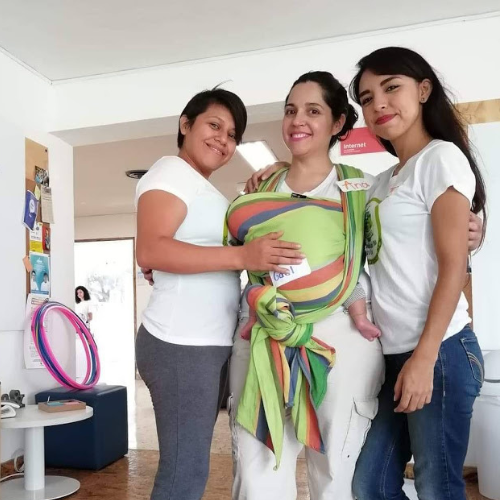Baby Terra: A mother’s vision for a greener, fairer future
When Ana María Acosta Ruiz fell pregnant with her first child in 2013, she quickly realized the financial strain of pregnancy and motherhood.
3 MIN READ
IMPACT story
MEXICO

25 JUNE 2025
As an architect in a dual- income household in Monterrey, Mexico, Ana was relatively well off, but still had to travel to wealthier neighbourhoods for antenatal classes and pregnancy-related resources. This sparked a realization: if motherhood was expensive and challenging for her, it must be even harder for women with fewer resources.
Determined to make a difference, Ana began researching ways to maintain her low-waste lifestyle while raising a child. She discovered that even parenthood could have a low carbon footprint. At the same time, she noticed a growing number of homeless and teenage mothers knocking on her door, seeking assistance. Their struggles resonated deeply with her. ‘Struggling there with all my resources, I was moved by the other mothers I met. I wanted to do whatever I could to make sure that every kid could have what my kids had,’ she recalls. ‘All children deserve the best possible start.’
From these experiences, Ana informally started a diaper bank that soon evolved into Baby Terra, a social enterprise dedicated to providing sustainable and affordable diapering solutions. The initiative operates on three main pillars:
Determined to make a difference, Ana began researching ways to maintain her low-waste lifestyle while raising a child. She discovered that even parenthood could have a low carbon footprint. At the same time, she noticed a growing number of homeless and teenage mothers knocking on her door, seeking assistance. Their struggles resonated deeply with her. ‘Struggling there with all my resources, I was moved by the other mothers I met. I wanted to do whatever I could to make sure that every kid could have what my kids had,’ she recalls. ‘All children deserve the best possible start.’
From these experiences, Ana informally started a diaper bank that soon evolved into Baby Terra, a social enterprise dedicated to providing sustainable and affordable diapering solutions. The initiative operates on three main pillars:
-
Educating women about reusable diapers and their financial and environmental benefits.
-
Teaching women how to make reusable diapers.
-
Collecting gently used diapers, professionally washing them, and redistributing them to parents who cannot afford to buy them.
Ana envisioned Baby Terra as a bridge between those who can afford reusable diapers and those who cannot. Initiatives like this are at the heart of what ITC does – improving life for entrepreneurs by growing businesses that take the environment seriously.
In 2019, she formalized the initiative into a business, but soon faced unprecedented challenges with the onset of COVID-19 and later, a severe drought that impacted demand due to water shortages for washing. Nevertheless, she persevered, receiving valuable support through the Dream Builder programme from a state department and additional training from a university course.
In 2019, she formalized the initiative into a business, but soon faced unprecedented challenges with the onset of COVID-19 and later, a severe drought that impacted demand due to water shortages for washing. Nevertheless, she persevered, receiving valuable support through the Dream Builder programme from a state department and additional training from a university course.

All children deserve the best possible start.
Ana María Acosta Ruiz
Founder of Baby Terra
Now, together with her two teammates – both working mothers who share her vision – she tirelessly reaches out to shelters, prisons, and community centres, knocking on doors to expand Baby Terra’s reach.
One of the major turning points for Baby Terra came through Ana’s experience with the tailored coaching delivered under SheTrades and the UPS Women Exporters Programme, which introduced her to a network of like-minded individuals committed to eco-friendly and socially responsible business practices. ‘It was like magic to find out that there are other people who are committed to this way of life,’ she says. The experience also helped her learn about digitizing her business and leveraging AI solutions.
Channeling her learnings into action, Ana and her team are developing a WhatsApp chatbot to assist parents struggling with reusable and hybrid diapers. Users can message Baby Terra with their washing machine model, and the chatbot, using a database of manuals, will provide tailored washing instructions. With only three working mothers managing the initiative, this technological advancement will be a game-changer in saving time and increasing efficiency.
Reflecting on her journey, Ana offers this advice to fellow entrepreneurs: ‘Believe in the power of community. Get out there and meet others, and keep a mindset of helping others climb with you. They will do the same for you when you need it most.’
Through Baby Terra, Ana María Acosta Ruiz is not only transforming the lives of parents in need but also proving that business can be a powerful tool for social and environmental change.